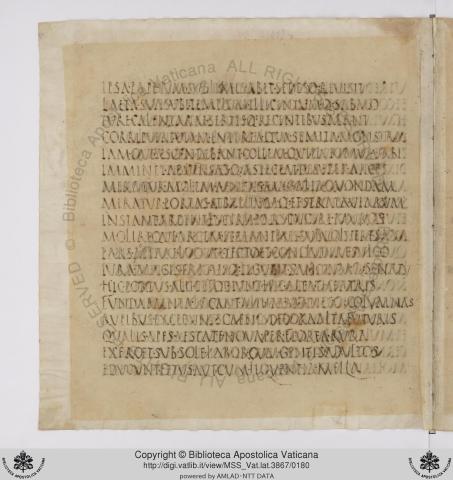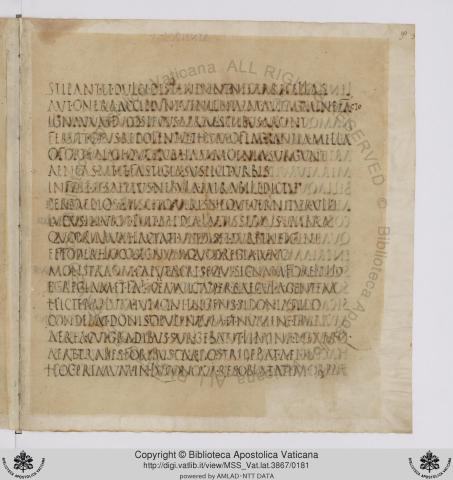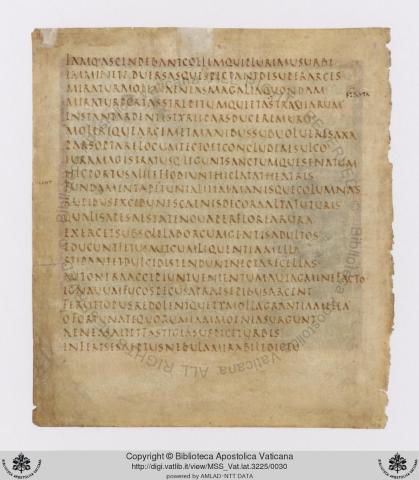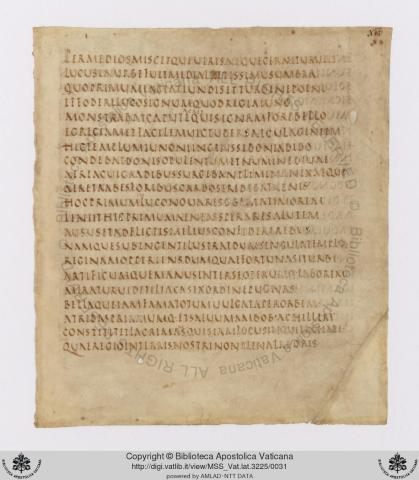CORE VOCABULARY
corripiō, ripuī, reptus, 3, a.: to take completely or eagerly; to grasp, snatch, seize, catch, 1.45; hurry away, 1.100; tear away; hasten on, take, 1.418; raise quickly, rouse, 4.572; sē corripere, to hasten away, 6.472. (com- and rapiō)
intereā: (adv.), amid these things; meanwhile, in the meantime, 1.418, et al.
sēmita, ae, f.: a byway, lane, 9.383; path, 1.418. (sē- and cf. meō, to go)
mōnstrō, āvī, ātus, 1, a.: to show, point out, indicate, 1.444; inform, tell, 1.321; direct, incite, 9.44; ordain, appoint, prescribe, 4.636. (mōnstrum)
collis, is, m.: a hill, freq.
immineō, 2, n.: to rest over; overhang, 1.165; to be at hand; approach, 9.515.
aspectō, āvī, ātus, 1, intens. a.: to look at or upon, behold, 10.4; survey earnestly, 6.186; with admiration, 1.420; with regret, 5.615. (ad and spectō)
dēsuper: (adv.), from above; above, 1.165.
mōlēs, is, f.: a cumbrous mass; a heavy pile or fabric; mound, rampart, 9.35; dike, 2.497; a mass of buildings, vast buildings, 1.421; structure, 11.130; frame or figure, 2.32; bulk, 5.118; weight, 7.589; pile, mass, 1.61; gigantic frame, 5.431; warlike engine, siege tower, 5.439; array, pomp, train, 12.161; body of soldiers, phalanx, 12.575; heavy storm, tempest, 5.790; toil, work, labor, 1.33.
Aenēās, ae, m.: 1. A Trojan chief, son of Venus and Anchises, and hero of the Aeneid, 1.92. 2. Aenēās Silvius, one of the Alban kings, 6.769.
māgālia, ium, n. pl: huts, dwellings, 1.421. (a Punic word)
strepitus, ūs, m.: a noise; an uproar; din, 6.559; stir, noise of festivity, 1.725; confused noise, 1.422. (strepō)
strātum, ī, n.: that which is spread out; a layer, cover; bed, couch, 3.513; pavement, 1.422. (sternō)
īnstō, stitī, 1, n.: to stand on or upon; w. dat., acc., inf., or alone; w. dat., to stand on, 11.529; stand or hang over, 10.196; (w. acc.), to work at, ply work upon, 8.834; (w. inf.), urge on, press on, 1.423; persist, 10.118; (alone), to follow up, press on; pursue, 1.468; struggle, 12.783; be near at hand, approach, threaten, 12.916; to be urgent, important, incumbent, 4.115.
ārdēns, entis: burning, hot, sparkling, flaming, 5.637; bright, 4.482; impassioned, ardent, eager, 1.423; spirited, fiery, 1.472; glowing, lofty, 6.130; fierce, furious, 2.529; angry, 6.467. (ardeo)
Tyrius, a, um: adj. (Tyrus), of Tyre; Tyrian or Phoenician, 1.12; subst., Tyrius, iī, m., a Tyrian, 1.574; pl., 1.747.
mōlior, ītus sum, 4, dep. a. and n.: to pile up; build, erect, construct, 1.424; plan, undertake, attempt, 2.109; pursue, 6.477; cleave, 10.477; contrive, devise, 1.564; occasion, 1.414; prepare, equip, 4.309; arrange, adjust, 12.327; of missiles, discharge, hurl, 10.131. (mōlēs)
manus, ūs, f.: the hand, 1.487; freq.; (meton.), action, movement of the hand; work, art, handiwork, 3.486; prowess, heroic deed, action, 2.434; force, violence, 2.645; a collection of persons; a band, crew, troop; an army, 2.29; forces, 5.623; multitude, 6.660; pl., manūs, workmen, 11.329; dare manūs, to yield, 11.558; extrēma manus, the finishing hand or touch, 7.572.
subvolvō, volvī, volūtus, 3, a.: to roll up, 1.424.
conclūdō, clūsī, clūsus, 3, a.: to shut completely; shut around, inclose, surround, 1.425. (com- and claudō)
sulcus, ī, m.: a furrow, 6.844; furrow, 1.425; track, train, 2.697.
magistrātus, ūs, m.: magistracy; a civil officer, magistrate, 1.426. (magister)
portus, ūs, m.: a port, harbor, haven, 1.159, et al; (fig.), 7.598.
effodiō, fōdī, fossus, 3, a.: to dig out, excavate, 1.427; dig up, 1.443; dig, thrust out, 3.663. (ex and fodiō)
theātrum, ī, n.: a place for seeing; a theater, 1.427; any place suited for public spectacles; theatrī circus, the curving area of a theater, formed by nature, 5.288.
fundāmentum, ī, n.: a foundation, 4.266. (1. fundō)
locō, āvī, ātus, 1, a.: to place, put, 1.213, et al.; lay, 1.428; found, 1.247. (locus)
immānis, e: (adj.), vast, huge, immense, 1.110; wild, savage, barbarous, 1.616; cruel, ruthless, 1.347; unnatural, monstrous, hideous, 6.624; (adv.), immāne, wildly, fiercely, 12.535.
columna, ae, f.: a column, pillar, 1.428; Proteī columnae, the pillars of Proteus; the northern extremities of Egypt, 11.262.
rūpēs, is, f.: a rock, cliff, crag, ledge, freq.; quarry, 1.429. (rumpō)
excīdō, cīdī, cīsus, 3, a.: to cut out, 1.429; cut off, away, or down, 2.481; destroy, 2.637. (ex and caedō)
scaena, ae, f.: the stage of a theatre, 4.471; a sylvan scene, view, 1.164.
futūrus, a, um: about to be; future, 4.622. (sum)
apis (-ēs), is, f.: a bee, 1.430, et al.
aestās, ātis, f.: the summer, 1.265, et al.; summer air, 6.707; a year.
flōreus, a, um: adj. (flōs), flowery, 1.430.
adolescō, olēvī, ultus, 3, inc. n.: to grow up, of animals or plants; become mature, ripen, 12.438; burn, blaze, 4.379; p., adultus, a, um, grown up; mature, 1.431. (adoleō)
fētus, ūs, m.: a bearing or breeding; the young; the new swarm, 1.432; litter, 3.391; of vegetable products, growth, sprig, shoot, 6.207; fruit; product.
liqueō, liquī, 2, n.: to be fluid; p., liquēns, entis, liquid, fluid, 5.238.
mel, mellis, n., pl., mella, abl., mellibus (no gen. or dat.): honey, 6.420.




